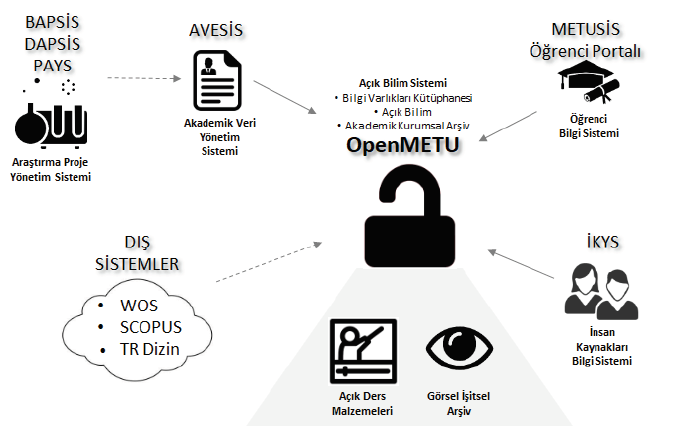OpenMETU

Institutional academic archives are structures that enable universities to compile, store and protect their knowledge resources on a digital platform, allowing open access in line with copyright laws and international standards. These structures enable institutions to manage their own knowledge resources, evaluate their potential, and contribute towards interdisciplinary studies by increasing academic visibility.
Allowing researchers open access to the scientific knowledge produced by others, within an ethical framework, is of great importance for scientific progression. The open-access system is a structure that supports and facilitates one of the primary purposes of universities: the provision on national and international platforms of new products and services resulting from their research. OpenMETU, created within this scope, aims to provide Internet access to the scientific information produced by METU, without any financial, legal, or technical obstacles.
The METU postgraduate electronic thesis archive has provided open, digital access to all postgraduate and doctoral theses completed since its launch in 2003 by the Department of Library and Documentation. The METU postgraduate electronic thesis archive system is the first open-access system in our country. OpenMETU, enriched with its research data, software products, articles, book chapters, conference papers, and presentations, is built on this structure.
METU’s institutional academic archive OpenMETU is available to anyone upon provision of a reference.
- OpenMETU, METU Open Science and Academic Institutional Archive platform primarily aims to provide content access to the researchers. OpenMETU gains access to the content in two ways:
- Direct access to the full-text of the study (pre-print, post print, publisher version)
- Indirect access through the metadata of the study
- OpenMETU is bound by the copyright terms and ethical rules while pursuing this goal.
- Every information contained in OpenMETU is indexed by Google. Thus, it is important to provide the correct metadata about the content. It is critically important to enter the title of the content, author, publisher, and the date of issue correctly and to provide related access links and DOI number. The metadata such as abstract and keywords is effective in the listing of the search results of the study.
- OpenMETU is not person-oriented, but publication/study-oriented, as opposed to performance evaluation systems. In OpenMETU, individuals are also included as an asset and associated with other assets. Even if the name of the author is written differently and does not match the relevant person in OpenMETU, it does not affect the direct access to the publication. However, it is necessary for the publication of the author to be seen together and the integrity of the system. It is important to notify such situations to open@metu.edu.tr mail address or to correct them.
- In OpenMETU, our assets are structured through the communities such as faculties, institutions, research centers, and Northern Cyprus campus. Sub-communities have been also formed to match our departments. The collections were determined to reflect the asset type of the communities.
- The content that are entered/uploaded to OpenMETU by the researcher falls under the control of the relevant unit in the Library. Here, it is published by controlling the publisher policy and copyright terms. Hence, the researchers can upload their studies without hesitation.
- OpenMETU aims to work integrated with internal and external information sources so that researchers do not have to upload a data to more than one system. Figure 1 displays the systems that OpenMETU aims to integrate.

According to the diagram, every asset entered to the index system of Avesis, Open Course Materials, Audiovisual Archive and TÜBİTAK TR is automatically transferred to OpenMETU. The researchers should only check the author match.
- METU Open Science PolicyThe development and change in information and communication technologies have significantly affected the ways in which knowledge is produced, recorded, and accessed. The free sharing of the produced knowledge with the public and the need for efficiency and re-use of information has developed the concepts of “Open Access” and “Open Science” in the world. In this regard, Middle East Technical University (METU) is committed to contributing to the advancement of science and technology at an advanced level and to the wide dissemination of knowledge for the benefit of society and all stakeholders by adopting open, reproducible, and reliable research outcomes and practices.
METU believes that open science contributes to making research more transparent and rigorous; it encourages innovation and participation of all segments of society in scientific studies. For this purpose, METU is attentive to develop and use the tools and research processes that encourage and support open science, and open access to publications, course resources, and research data.
- Publication Upload Guide to OpenMETUYou can contact us via open@metu.edu.tr for any of your questions, problems and suggestions.
- Term Project Upload Guide for Non-Thesis Master’s ProgramA new collection titled “Term Project” has been created on OpenMETU for non-Thesis Master's studies, and the interfaces that students can use to upload their studies have been added to the system.